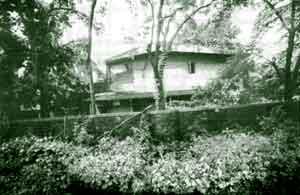dhrupad & the art of "searching"
Early this morning, my email inbox included material relating to the dhrupad workshop I'm gearing up to attend in mid-November -- traveling to India for the purpose. (Got airline tickets yesterday morning.) The material (and some consequent return correspondence) largely involved practical matters, typical for a situation of international students traveling abroad to a small educational institution. (We will all be lodged at the gurukul -- the teacher's abode -- for the workshop period, practicing & listening, living & eating; the school is opened up once a year in this way; the rest of the year, only longterm-resident students study there. Most workshop students will be present for a full month; my stay will be two weeks.) The material from the school did also include some reflective prose about the music and the approach to its teaching. This was included in my reply-note:
Glancing at the material you attached, I'm struck by this beautiful observation:
 I don't know to what degree I may blog from Panvel (where the Dagars' school is located -- an olden village some ways beyond Mumbai along the Mumbai-Pune Expressway); likely to some small extent. Most of the time we'll be occupied with the music.
I don't know to what degree I may blog from Panvel (where the Dagars' school is located -- an olden village some ways beyond Mumbai along the Mumbai-Pune Expressway); likely to some small extent. Most of the time we'll be occupied with the music.
The "riyaaz" is the musical practice -- an Urdu word somewhat akin to the Sanskrit sadhana. It's said the great progenitor of the Dagar lineage (now in its 20th generation with Bahauddin Dagar) was a Hindu, a Brahman -- who converted to Islam through a curious stroke of fate. I'll relate that tale (and others) a bit further along in this dhrupad blogging. Early on in our workshop period, there will be the three-day Barsi (dhrupad music festival). I'll surely take a few notes of impressions. The only time I've heard Ustad Zia Fariduddin Dagar sing was in one rooftop concert, well after midnight, in Pune nearly 20 years ago. The music struck me favorably. Ustad Fariduddin heads the Dagars' music school -- a duty he assumed after his cousin Ustad Zia Mohiuddin passed away in 1990. Evidently, at one time, Mohiuddin was called the "bara Ustad" [big / elder maestro] and Fariduddin the "chota [little / junior] Ustad." I suspect Zia Fariduddin must be a Maha-Maestro at this stage. Whatever the dimension of the personality, it's a puissant music he and his kin have carried forward into the 21st century. I look forward to a serious dose of this rare music, a few weeks hence. (My flight departs November 10th from the airport at Baltimore. Traveling via London, I'll arrive in Mumbai just after midnight into the 12th. The workshop begins early-morning Nov. 15. In the 3-day interim: other activities, to be noted later.)
Dhrupad could be deemed a kind of endangered musical species; but the Ustads Zia Fariduddin and Bahauddin have been actively teaching: both at Panvel, and also in Mumbai (including via the "dhrupad sansar" for benefit of students at IIT-Bombay, a university). Dhrupad study can also be pursued at the dhrupad gurukul in Bhopal. But I tend to favor Panvel -- ensconsed between Mumbai and Pune. Both Mumbai and Pune have attractions.
Glancing at the material you attached, I'm struck by this beautiful observation:
This is a music that depends very little on virtuosity. Here whatever becomes music is what has been contemplated upon. The onus of riyaaz goes beyond touching the purity of the swaras and ragas, to reflect on the nature of relationship that exists between the musician and the music he seeks to create; and eventually beyond to when this dichotomy dissolves and all that remains is the musical search alone.This has been my hunch about dhrupad in general -- and serves as a kind of "explanation" for what draws me to this line of study per se. As a listener, I certainly love khayal and other Hindustani musical forms. But my feeling, or hunch, is that as a music-student (and life-student), the approach found in your dhupad school -- emphasizing the principles noted here -- may prove most suited to my basic nature as an "inquiring artist." My feeling, too, is that the feeling of search and discovery lodged in this musical tradition, is in principle in open "communication with" (or can have infinitely various application or expression through) any and every art form. I am a practicing poet and painter, and am turning now to dhrupad -- partly in an effort to deepen my understading of what's expressed (and how it's discovered) through any medium. What's learned from dhrupad can (I feel) be expressed in painting and poetry, even though its chief application and "voice" is musical.
 I don't know to what degree I may blog from Panvel (where the Dagars' school is located -- an olden village some ways beyond Mumbai along the Mumbai-Pune Expressway); likely to some small extent. Most of the time we'll be occupied with the music.
I don't know to what degree I may blog from Panvel (where the Dagars' school is located -- an olden village some ways beyond Mumbai along the Mumbai-Pune Expressway); likely to some small extent. Most of the time we'll be occupied with the music.The "riyaaz" is the musical practice -- an Urdu word somewhat akin to the Sanskrit sadhana. It's said the great progenitor of the Dagar lineage (now in its 20th generation with Bahauddin Dagar) was a Hindu, a Brahman -- who converted to Islam through a curious stroke of fate. I'll relate that tale (and others) a bit further along in this dhrupad blogging. Early on in our workshop period, there will be the three-day Barsi (dhrupad music festival). I'll surely take a few notes of impressions. The only time I've heard Ustad Zia Fariduddin Dagar sing was in one rooftop concert, well after midnight, in Pune nearly 20 years ago. The music struck me favorably. Ustad Fariduddin heads the Dagars' music school -- a duty he assumed after his cousin Ustad Zia Mohiuddin passed away in 1990. Evidently, at one time, Mohiuddin was called the "bara Ustad" [big / elder maestro] and Fariduddin the "chota [little / junior] Ustad." I suspect Zia Fariduddin must be a Maha-Maestro at this stage. Whatever the dimension of the personality, it's a puissant music he and his kin have carried forward into the 21st century. I look forward to a serious dose of this rare music, a few weeks hence. (My flight departs November 10th from the airport at Baltimore. Traveling via London, I'll arrive in Mumbai just after midnight into the 12th. The workshop begins early-morning Nov. 15. In the 3-day interim: other activities, to be noted later.)
Dhrupad could be deemed a kind of endangered musical species; but the Ustads Zia Fariduddin and Bahauddin have been actively teaching: both at Panvel, and also in Mumbai (including via the "dhrupad sansar" for benefit of students at IIT-Bombay, a university). Dhrupad study can also be pursued at the dhrupad gurukul in Bhopal. But I tend to favor Panvel -- ensconsed between Mumbai and Pune. Both Mumbai and Pune have attractions.


3 Comments:
oh no! -- "the search that's better than search?" (& for this I need georgia highway construction?)
O anonymous!
the highway I hope to construct
is not in georgia nor new england
it's not in the gobi nor the arctic
it runs between sa and sa
is it easy to build?
is it easy to find?
you try & then tell me
it begins at dawn
in a land calaled nowhere
travels along a breath
into the realm of somehow
no buying nor selling
(no word of advertisement)
holds sway
on this road anonymous!
hahaha, put the 'word guard' or whatever its called on.
i think panvel you could get yourself a reliance dial up. carry your laptop. heard nice things bout that school.
Arjun,
glad to hear this note of the school's good repute -- and likewise the note about, I guess, a form of mobile wifi? Will have to check that out, obliged for the tip.
Post a Comment
<< Home